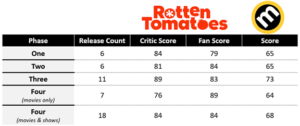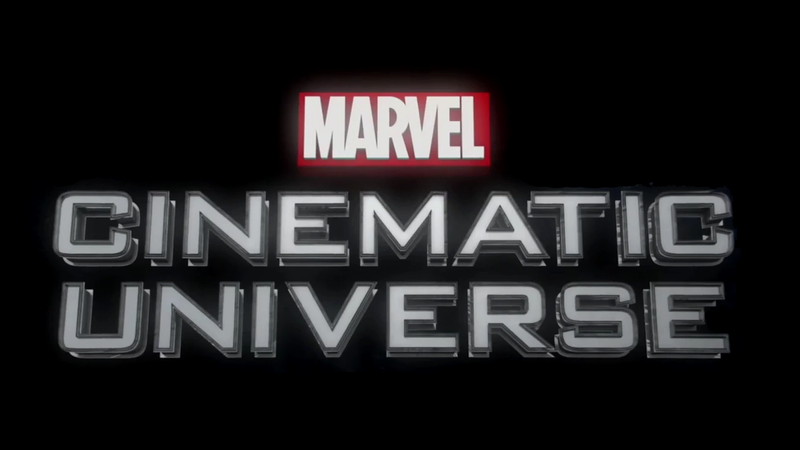I don’t consider myself a cinephile. I also don’t really have the education or experience in filmmaking to criticize movies professionally or philosophically discuss what broadly advances cinema. However, like most people, I know what I love about movies and what will bring me to the theater. For the last 15 years and foreseeable future, the superhero movie genre, specifically the Marvel Cinematic Universe, has been that draw for me. Ever since I was a young boy, I have always loved anything pertaining to superheroes. I’ve read comics off and on, watched tons of animated series, and have shown up for superhero content since Batman (1989). I even watch YouTube videos breaking down the easter eggs, easily missed details, and potential future storylines. In other words, a good superhero film can entertain me for a while and will be fun on repeat viewings.
That’s why I surprised myself when I realized, while suggesting movies to a family member, that Everything Everywhere All at Once was my favorite movie from 2022. . . What? I didn’t say that I only watched superhero movies. I really can’t remember the last time a Marvel movie wasn’t my favorite movie of the year. If you told me that in the same year with a Doctor Strange and a Black Panther movie that a critically acclaimed and Oscar winning indie movie would be my favorite . . . I would seriously wonder if you fell and hit your head or something.
So intuitively, I know Marvel Phase 4 wasn’t as compelling as previous phases. But I still had a good time watching every movie and show, and I’m really pumped for the Multiverse Saga going forward. However, if you google “Marvel Phase 4 Problems” or search “Marvel Phase 4 Sucks” on YouTube, you’d think Marvel had put out a slate of laughably bad movies and shows that have now put itself and the entire superhero movie concept in question or on a path to imminent failure. I won’t waste your time by covering all the critiques I saw, but I recommend a thorough internet search if you want a deeper background on this post.
To that, I just want to tell everyone carrying those hyperbolic takes, even if just for entertainment purposes, to take a deep breath and think of something calming. It’s really not that bad. In this post, I will look at some of the more, in my opinion, objective critiques I found about Phase 4. If you have a problem with story beats, characters, group representation, CGI, or other things that are really a matter of taste, I’m more than happy to let you continue your Marvel bias without interruption. However, some critiques invoke general business concepts, the Marvel business model, or other issues that we can look at with more objectivity. Then, we’ll conclude with the real threats to Marvel and superhero movies that studios should look for when planning the future. With that, let’s assemble and take on Marvel Phase 4.
Box Office Results Don’t Mean What They Say
In your future searches about Marvel Phase 4 problems, you might hear something like “Phase 4 didn’t make as much money as the prior phases, which means people are giving up on Marvel.” This is simply incorrect. Do not turn to these people for business analysis. We all know one reason why Marvel didn’t earn the same money in prior phases, which is the pandemic. Not only is the entire industry down 35%, but there are also a lot of questions about whether consumers have changed their movie viewing habits for good.[1] More and more people are opting to wait until streaming, which is pressuring theaters to add to their in-person experience.[2] I know this will make some of you cringe, but I’ve had a long standing rule about only going to the theater for movies with big special effects or action. There are many great movies with dialogue as their best and climatic moments, but I catch those on streaming now. And it seems like I’m not alone in drawing lines on what is a prerequisite of going to the theater.
Another Covid impact is on international distribution, which became more limited everywhere, including China. Marvel, who makes 60% of their box office on average internationally,[3] went without distribution in China for about four years, which is basically all of Phase 4.[4] But it’s not just China. The pandemic clearly forced Marvel to limit its entire international distribution during the pandemic. Some people point to the fact that Spider-Man: No Way Home made $1.9B at the box office as evidence that people would still see the movies if they were good. Once again, this is faulty. Spider-Man: No Way Home, in addition to featuring one of the best-known superheroes ever, was released in 70 countries with a re-release in 16 countries.[5] Doctor Strange in the Multiverse of Madness, which came really close to the billion dollar-mark, was released in 47 countries.[6] Black Panther: Wakanda Forever was released in 45 countries, which included China but only about 3 months after the original release date.[7] For context, Doctor Strange (2016) was released in 78 countries,[8] and Black Panther (2018) was released in 70 counties.
Continuing in the spirit of not comparing apples to oranges, Phase 4 critics must be careful to not be foiled by basic math as well. On its face, Marvel worldwide box office receipts dropped 58% and domestic box office dropped 48% between Phase 3 and Phase 4.[9] This is well ahead of the 35% industry dop and would be proof that Marvel fans have given up on Phase 4. But . . . Marvel Phase 3 had four more movies, including two of the highest grossing films of all time. Of course, Marvel did have 11 Disney+ releases in Phase 4, but those numbers are tucked inside the overall revenue for the platform along with Star Wars projects and everything else. If you look at the domestic box office on a per movie basis, the drop is a much more impressive 18% or only a little over half of the total industry drop. By the box office numbers, Marvel is not in trouble or at least in way less trouble than the whole industry.
Quantity over Quality
I take this criticism more seriously than the faulty business analysis. However, it is a problem that works both ways. Marvel and the other superhero movies are basically the Westerns of our day. Westerns had an incredible run as a dominant genre in Hollywood from the silent film era to the late 1960s.[10] With multiple studios putting out many westerns of inconsistent quality, the genre eventually burned out. Especially with audience and consumer tastes beginning to change.[11] Marvel and the superhero genre is insulated from this a little bit. With two main studios driving superhero content, the opportunity for genre exhaustion seems less likely.
An increase in quantity does allow more opportunities for quality to slip, but it also gives an opportunity for a rebound. In Phase 4, Thor: Love and Thunder and Eternals became two of Marvel’s lowest rated movies on Rotten Tomatoes and Metacritic. As you’ll see in the chart below, this drove the average Phase 4 Rotten Tomatoes and Metacritic score to the lowest of any phase. However, when you factor in the 7 Disney+ shows, then Phase 4’s average scores look more normal.

(Note: Scores are averages. Logos from Wikipedia Commons)
Ultimately, there is more to love and hate for both critics and fans. This affirms that there is a balance for Marvel to walk in the amount of content. Disney will seemingly take care of this problem by force, or maybe a snap, with its current cost-cutting plan impacting Phase 5 production and releases.[12] Marvel Studio Head Kevin Feige also understands that rationalizing releases will help Marvel recreate the pop cultural impact and moments that it wants.[13] By the numbers, Marvel maintained its standard critical reception. But it did so the hard way with volume, a process they are currently rethinking.
The Marvel Formula and Superhero Fatigue
Marvel criticism for being too formulaic coupled with the argument around superhero fatigue directly related to (and often supported by) matters of taste.[14] For background, the Marvel Formula is a little vague, but it seems to have everything to do with the plot structure, CGI, comedy, and budget size.[15] This mixture has created the consistent Marvel quality we’re used to.[16] Superhero fatigue is the concept that audiences will tire of these movies and move on to something else like the aforementioned Westerns.[17] Phase 4 has certainly been the target of both Marvel Formula criticism and speculation around increasing superhero fatigue.[18]
But whenever I read about these concerns, it sounds more like questions around business maturity.[19] Basically, the quintessential business question: how long will a good thing last? Maybe it’s asked by tired critics who never loved superhero movies and are wondering how many more they have to watch before audiences get to something else. Maybe it’s asked by fans, like me, who want to make sure they always have a slate of superhero movies to watch. Maybe it’s asked by people who are looking at Marvel’s dominance and weighing that against Marvel’s responsibility to push cinema as an art form forward.[20] Either way, when will Marvel fall?
I think we’ve established that Phase 4 is far from proof that Marvel is ready to crumble. It might however be reaching maturity, even though evidence of this is sparse as well. For example, Marvel’s worldwide box office receipts per movie grew from 38% between Phase 1 and Phase 2 and 40% between Phase 2 and Phase 3.[21] Then the pandemic hit, which skewed the data. Were box office receipts going to grow by 40%+ or was growth going to slow? I can’t tell. With movies, even slowing growth doesn’t necessarily mean that the business has hit maturity. Of course, a business entering maturity doesn’t mean that it’s going anywhere. In many ways, wondering about when the MCU will end as a business is like asking when will McDonald’s, General Electric, Coca-Cola, or Google end? No business will necessarily last forever, but if the MCU is still making strong revenue, even decades and decades from now, it will still be making superhero movies.[22] Its role in Hollywood and cinema might change, but it will still be there.
Real Threat and Conclusion:
If it’s a matter of taste that you didn’t like Phase 4, then it would be fun debating the legacy and new characters, the explorations of grief, the story and plot point experiments, etc. However, extrapolating that to a pending Marvel business failure is a big stretch. The real threat to Marvel is exactly what you think it is. If people just randomly lose interest or they fail consistently to make movies that are fun and worth watching, then our superheroes will be under a much greater threat than any villain could muster. But none of that has happened yet, so I will see you at the movies.
[1] https://youtu.be/a_GG5KPlnPo (PBS Newshour Report) and https://www.statista.com/statistics/187069/north-american-box-office-gross-revenue-since-1980/
[2] See note i.
[3] Based on analysis of IMDB data
[4] https://www.cnn.com/2023/01/19/media/disney-marvel-film-releases-china-intl-hnk/index.html
[5] https://www.imdb.com/title/tt10872600/releaseinfo/#releases
[6] https://www.imdb.com/title/tt9419884/releaseinfo/
[7] https://www.imdb.com/title/tt9114286/releaseinfo/
[8] https://www.imdb.com/title/tt1211837/releaseinfo/?ref_=tt_dt_rdat
[9] Based on analysis of IMDB data.
[10] https://screenculturejournal.com/2017/04/the-decline-in-popularity-of-the-western-film-genre/
[11] See note ix.
[12] https://www.giantfreakinrobot.com/ent/marvel-shows-risk-disney-cuts.html
[13] https://www.ign.com/articles/marvel-president-kevin-feige-disney-plus
[14] https://www.cbr.com/signs-audiences-critics-have-superhero-fatigue/#some-directors-criticize-the-genre
[15] https://thesciencesurvey.com/arts-entertainment/2022/03/06/the-marvel-formula-is-the-key-to-box-office-success/#:~:text=The%20steadfast%20popularity%20of%20movies,%2Dgenerated%20imagery%20(CGI)
[16] See note xv.
[17] See note ix.
[18] https://www.theguardian.com/film/2022/jul/12/have-we-gone-from-marvel-fatigue-to-marvel-exhaustion ; https://morningconsult.com/2021/12/06/marvel-superhero-film-fatigue/
[19] https://www.themarysue.com/superhero-fatigue-conversation-needs-to-end/
[20] https://www.esquire.com/uk/culture/film/a40653210/martin-scorsese-marvel/
[21] Box office receipt analysis based on IMDB data.
[22] https://variety.com/2023/film/news/marvel-kevin-feige-superhero-fatigue-1235499609/



